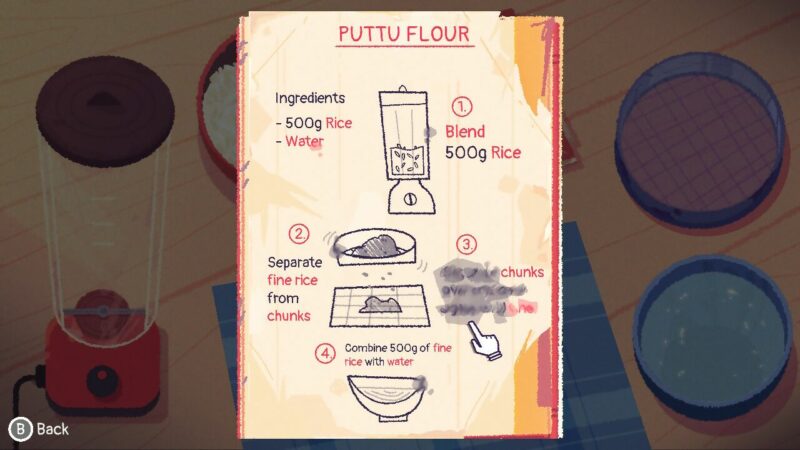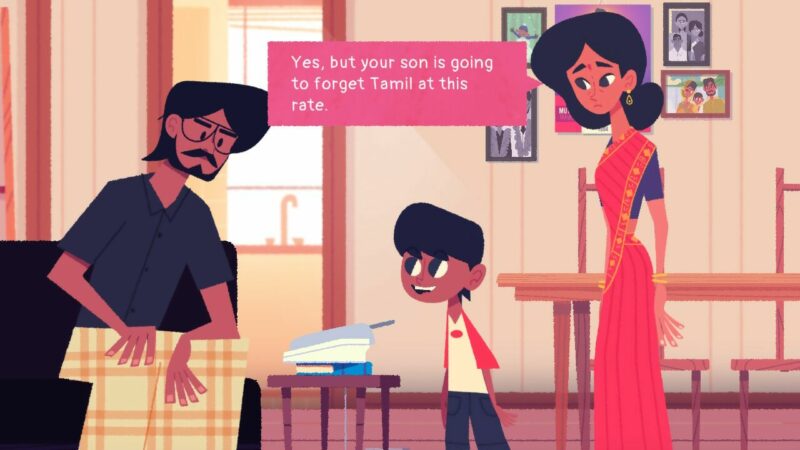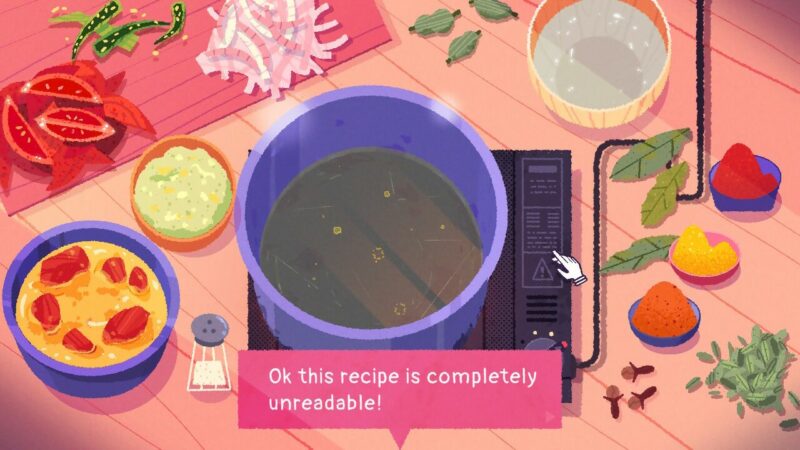
Much more than a cooking game, Venba is a short but nourishing drama about heritage and cultural identity. Here’s a our review.
It’s often said that the best way to understand another culture is through their food. And so, through your virtual tastebuds, Venba delights as a window into Tamil traditions. Its generation-spanning story also cuts deeper, and is evidently a personal, lived experience for its designer and creative director Abhi. In other words, this isn’t just a South Asian Cooking Mama.
Cooking games often employ superficial mechanics based on simulating timing and movement through QTEs. Venba, meanwhile, focuses on recipes, based on authentic Tamil dishes from humble Idlis to Biryanis. This means there’s a puzzle element to the cooking, as you try to figure out what ingredients go together and, perhaps most importantly, the order in which you prepare them.
Of course, you don’t have to be familiar with South Asian cuisine to enjoy Venba. Unfamiliarity is partly the point – you’re discovering, or more accurately re-learning, the recipes from the perspective of the game’s titular protagonist, as she attempts to reconnect with her culture.
One of the simplest devices to illustrate this is when Venba uses her mother’s recipe book. Over time, some of the handwritten steps become smudged out, meaning you’ll have to try to fill in the gaps yourself. Not that this is designed to punish you to repeat until you’ve memorised a recipe, as there’s always an option for hints where Venba will be able to remember a part of the directions. I still found it fun to struggle for a few attempts on my own, anyway.
Ultimately, the cooking, while exquisite in its own right – especially once you see the final illustrated dish – is a vehicle for a profoundly affecting story of family, culture, and identity that speaks universally, especially so for a second-generation immigrant like myself. My circumstances are considerably different from what’s depicted here, with the narrative spanning three decades, taking in Venba and her husband Paavalan, immigrants from South India to Canada. Then there’s their son Kavin, who speaks more English than he does Tamil (differentiated in the English text with a change of colour, with occasional ink blots indicating Venba’s difficulty in grasping what he’s saying) and prefers eating pizza instead of puttu.
Kavin’s conflict with his heritage, from preferring to be called Kevin at school to being embarrassed by the smells of his home cooked meals, are things that will likely hit home with many children of immigrants caught between cultural identities. This conflict in turn gives the dishes a bittersweet context, because on one hand they may represent a connection to Venba’s roots, but we also see the same dish presented as something unappreciated and even resented, the memories of these recipes at risk of being lost when the game’s characters belatedly trying to reconnect with them years later.

Credit: Visai Games.
Cooking takes up about half of the game’s one-to-two hour running time (a feature film length in other words). One chapter forgoes cooking altogether, while another ups the pacing with simpler input prompts. Still, I think Visai Games were wise to confine game mechanics to the kitchen rather than trying to gamify other interactions. Instead, its narrative sequences say what they want to say with the fewest words while the illustrative art style manages to express so much with the subtlest pose or line on someone’s face. While there’s the occasional opportunity to make dialogue choices for a shift in tone, the most effective moments are left in the script, such as a text message interaction where a character just wants to get something off their chest.
There’s a sense of intergenerational catharsis in excavating the story of one’s family (though this perhaps says more about my own cowardice in never explicitly broaching the subject with my own parents). Seeing the two future parents discussing their anxieties of how their unborn child will turn out based on their decisions, and learning about Pavalaan sacrificing his writing career in India for humiliating rejections and microaggressions in Canada, makes the guilt of being the selfish kid just wanting to be ‘normal’ all the more palpable.

Credit: Visai Games.
In trying to make a game that authentically and accurately represents one’s culture, there’s also the guilt that, if you had rejected your roots, can you actually deliver on that, or worse, does that make you a fraud? Those sentiments aren’t lost on the game, and considering there are a few names credited as food consultants, Abhi and the team weren’t alone in needing to lean on help to reclaim their heritage, which makes Venba not just a game but a preservation of Tamil culture.
Though I write about this from a specific perspective, I nonetheless believe Venba has the power to resonate with audiences regardless of their background. And while it’s a short experience, those rich flavours will continue to linger for much longer. That really does come down to how the game deftly balances its colourful celebration of culture with the underlying sadness and difficulties that come with being othered, while it also makes a point of whether more visible diversity is meaningful progress or merely emblematic of cultural appropriation.
Venba succeeds in understanding that representation is important, but that it can also be uncomfortable and painful to extract. It’s an observation that only makes Venba more important and nourishing.

Credit: Visai Games.
Highlight
As the story moves from the 1980s to the near-present, characters age and you’ll notice changes in technology, from different kitchen equipment to smartphones. One constant, however, is the analogue radio Venba listens to while she’s cooking. Through this you’ll hear a rich array of original songs inspired by Indian musicals, familiar sounds of home for her, and for us playing a text-based game, a chance to listen to the Tamil language.
Verdict: 85%
Short but bittersweet in how it both celebrates and reckons with one’s heritage, Venba is truly food for the soul.
Read more: Hot Pot For One | video game comfort food








